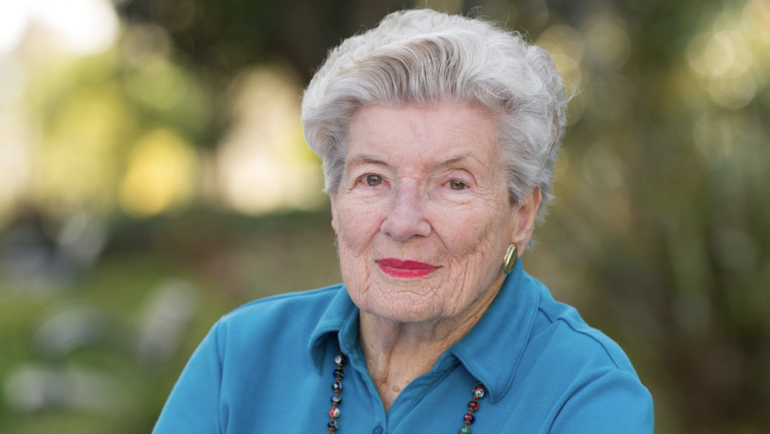
This article was originally published in the May/June 2020 issue of San Diego Lawyer.
By George W. Brewster Jr.
Women’s rights advocate and activist Belva Lockwood (1830-1917), one of the first female lawyers in the U.S. and the first female attorney to argue before the U.S. Supreme Court, did not live to see the passage of the 19th Amendment in 1920. Lawyers Club of San Diego, founded in 1972, advocates for the professional growth of and opportunities for women in the legal profession. The organization named an annual service award after Lockwood. The first recipient of that award was Betty Evans Boone.
Boone, who turns 92 this year, remains active in Lawyers Club (notably overseeing and organizing the Lawyers Club archives) and has been a steady role model for lawyers and law students since her enrollment at USD law school in August 1959. She was the lone woman in the school and only the second female law student to graduate from USD (the first being Mary Harvey in May 1959).
Much has been written about Boone. Her tales about law school, the Bar Association, and overcoming the reluctance (or downright refusal) of male law partners to hire female associates all weave into a telling tapestry of discrimination. But the heart of the story, this tapestry, is Boone’s continued perseverance and push to move things forward.
She was born in Baton Rouge, Louisiana — you can still hear her Southern dialect — and she got her undergraduate degree in Business Administration at Centenary College in Shreveport. She married James Boone in 1950, and thanks to his military service, they spent the next seven years overseas. In 1959 he was offered a job in San Diego with International Harvester, and they jumped at the chance to leave the 115-degree temps of Texas for the temperate climate of San Diego. They raised two boys here.
With some legal secretarial experience from jobs in Louisiana and Texas, she landed a secretarial position with Dutch Higgs’ firm. “He was very encouraging to go to law school,” said Boone, so she did, at night. The Dean of the school was also one of her professors, and he regularly asked her, “You still with us?” She was the only woman in the class; the other 70 students were men and generally older and married, having first served in the Korean War. When the school’s ABA accreditation was at issue, they scrambled to put a law review together, and Boone was included. In volume 1, the San Diego Law Review lists “Boone, Betty Evans, Book Review Editor, San Diego Law Review, Vol. 1, Jan. 1964.”
Boone took strength from another Betty — Betty Friedan and her groundbreaking book The Feminine Mystique, which came out in 1963. “This opened up things for women, and it carried a message to women that they didn’t have to be housewives only,” said Boone. Reflecting on her graduation in 1964, Boone said, “Higgs didn’t know what to do with me. He said it wouldn’t work out for me to work at his firm, as it would be hard to transition from having been a legal secretary there to now being a lawyer.” She spent about three years as in-house counsel for Title Insurance & Trust; the local company manager used her initials so that corporate wouldn’t know he had hired a female attorney. “It was hard to get work back then; there were very few women practicing.”
It was also tough breaking into bar activities; in fact, she literally had to break into the old University Club to attend a bar Probate Section committee lunch meeting, as the Club did not allow women to walk through the second floor to access the room where the lunch was being held. She used the side fire escape stairs, which accessed the dining room, to get in.
Her husband also went to law school at USD. During one job interview, she was asked if her husband was working. “Yes, I said. He then asked, well why are you seeking work? And I said it was because I wanted to work; I didn’t like housekeeping. He just couldn’t understand it.” She tells of a time when she had heard that at the San Diego City Attorney’s Office, raises were being given to all of the male attorneys, but not to any of the female attorneys. She encouraged them to fight it, and they hired the former City Attorney to represent them. They got their raises.
After a few failed attempts, Boone finally landed a job with the Office of County Counsel in 1967, as its first female deputy county counsel. She worked in education law, and eventually was promoted to Chief Deputy overseeing the Advisory Division (the first female Chief Deputy for that office). When she retired after 14 years with that office in 1981, there were 10 women deputies. She spent the next 14 years as an Administrative Hearing Officer (disability and retirement hearings). Looking back, she said quite simply and bluntly, “Success in my day was getting a job.”
Since 1995, Boone has overseen the historical archives for Lawyers Club, participating in the various anniversaries (30th, 40th — helping with a book and video history), and continues to help the organization prepare for its 50th anniversary in 2022.
The 19th Amendment gave women the right to vote. This, in turn, fueled other advances, including educational and vocational advancements. Boone is one of those individuals who took up the cause for equal rights and moved it forward.
George W. Brewster Jr. (sandbrews@aol.com) is a retired attorney after 35 years of practice, including JAG, private practice, and the last 30 with the County of San Diego, Office of County Counsel.